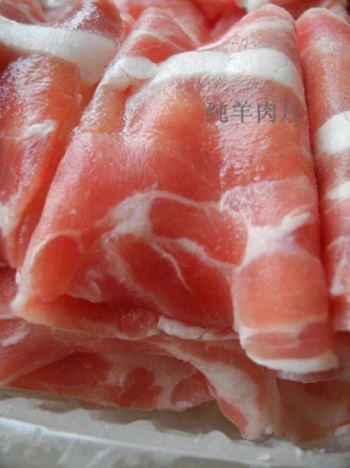China is a place where just about anything can be counterfeited. Unfortunately, this means that it is up to savvy consumers to distinguish the authentic from the fake. And while there is no shortage of fake goods readily available in China, one of the most ubiquitous is something you eat: lamb, particularly barbecued lamb skewers.
READ: Tell the Difference Between Real and Fake Zongzi For Dragon Boat Festival
As you might expect, spotting the difference between real and fake mutton can often be a tricky endeavour. To help you out, we’ve created a brief tutorial on how to spot fake lamb meat, safeguard yourself against being taken advantage during this upcoming hot pot season:
 As seen in the photo above, the meat and fat in real mutton is interconnected; the marbling fat is spread naturally through the meat.
As seen in the photo above, the meat and fat in real mutton is interconnected; the marbling fat is spread naturally through the meat.
On the other hand, the fat and meat of fake mutton are distinctly separated from each other. There is no bleeding between the two.
Here is a side by side comparison: fake lamb is on top, and the real mutton is below. Note the marbling.
When defrosting, the meat and fat of fake mutton can be easily separated from each other.
By comparison, real mutton will tear unevenly among the grain of the meat upon being defrosted.
The last two photographs are a side by side comparison of two kinds of meat after being fully defrosted: the fake mutton is on top, while the real mutton is below.
Another way to tell the difference between real and fake lamb meat is while it is being cooked in a hot pot. When put into boiling water for at least two minutes, fake mutton will unfurl and lose its shape and color; real mutton will retain its shape or even curl up further.
To be a savvy consumer in China, one must remain vigilant, aware, and mindful of shopping decisions. Keep this in mind as you stay safe and happy hot potting!
Related:
- New “Smart Chopsticks” Tell You If Your Food Is Poisonous
- Poppy Opiate Used at Foshan Restaurant to Make Food “Tastier”
- Beware This Hairy Crab Season: 99% of Yangcheng Crabs Are Fake
- Dongguan Counterfeiters Sold 19 Tons of Fake, Inedible Salt Over Two Years
- 600 Tons of Fake Salt Sold in Guangzhou
- [Surveillance Video] When a Simple BBQ Dinner Goes Horribly Wrong…
Photos: China News Finance, openrice

